Category: "Off-Broadway"
Review: The Shaggs: Philosophy of the World
Jun 9th
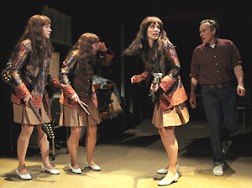
A fascinating footnote to pop music history is explored to probing effect in the new musical The Shaggs: Philosophy of the World. Music geeks will recall that the band was composed of three teen-age girls who--at the urging of their Mama Rose-style stage father—recorded an album of original songs in which their lack of any musical talent was more than evident. Although the self-pressed recording quickly lapsed into well-deserved obscurity, it was later championed by several notable rockers who were enamored of its authentic rawness. Re-released years later, it was hailed by Rolling Stone magazine and has since become a cult favorite.
Although it contains sly touches of humor, the show takes a decidedly serious approach to the story, with the father, Austin (Peter Friedman), depicted as a deluded, semi-abusive parent bullying his daughters into realizing his own unfulfilled dreams. The fact that they have neither the necessary desire nor musical skills is apparently beside the point.
Joy Gregory’s dark-tinged book covers all of the essential points of the tale, concentrating on the tyrannical father’s obsessive desire, inspired by the mammoth success of the Beatles, to turn his daughters into stars. The girls themselves are only sketchily depicted, with the exception of the youngest, Helen (Emily Walton), who has retreated into a world of silence. But her rebellious streak is indicated by her hidden relationship with a classmate (Cory Michael Smith), who she later secretly marries.
The show’s humor stems not so much from the characters but rather the sheer atrociousness of the girls’ performances. The scene in which they record their album as a couple of engineers look on aghast is a comic highlight.
Unfortunately, the show is never quite involving as it should be, with the turgid proceedings eventually proving monotonous. Not helping matters is the score by Gregory and Gunnar Madsen--which, with a few exceptions, such as the father’s final defiant number “Never Fade,” which he sings as he literally sinks into his grave--too often mirrors its inspiration’s atonality.
Still, the story itself is so fascinating that the show merits attention. And it has been given a hauntingly stark, stylized production courtesy of director John Langs. Friedman, frequently singing intentionally off-key, is galvanizing as the monstrous dad; Annie Golden is appealingly sympathetic as his compliant wife; Sarah Sokolovic, Emily Walton and Jamey Hood handle their dramatic and musical chores with aplomb; and Kevin Cahoon and Steve Routman score laughs in their multiple supporting roles.
At one point late in the evening, we hear an excerpt from the actual recording made by the real-life Shaggs. Its sheer horribleness provides ample testament to the bizarreness of the tale.
Playwrights Horizons, 416 W. 42nd St. 212-279-4200. www.ticketcentral.com.
Review: Through a Glass Darkly
Jun 7th
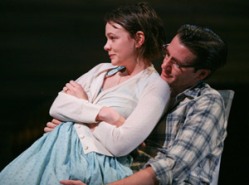
Through a Glass Darkly, the theatrical adaptation of Ingmar Bergman’s 1961 film being presented by the Atlantic Theater Company, demonstrates how much his work depended on the brilliant use of imagery. This claustrophobic portrait of a young woman succumbing to mental illness feels dramatically wan on stage, despite an artfully atmospheric production by David Leveaux and excellent work by the fine four-person ensemble, including rising star Carey Mulligan (An Education, Broadway’s The Seagull) in the lead role.
Set in 1960 on a remote island (Bergman’s home of Faro in the film), the work-- adapted for the stage by Jenny Worton and previously seen at London’s Almeida Theatre—concerns a family vacation undertaken by twentysomething Karin (Mulligan); her solicitous, doctor husband Martin (Jason Butler Harner); her 16-year-old brother Max (Ben Rosenfield); and her self-absorbed, novelist father David (Chris Sarandon).
Despite Karin’s optimistic comment that “everything will be perfect this holiday,” it quickly becomes apparent that this will not be the case. Karin is clearly suffering from some sort of schizophrenia, a disease to which her mother succumbed. Gripped in the throes of religious hysteria, she comes to believe that she has a direct conduit to God.
Her husband attempts to treat her with regular doses of sedatives to little avail, while her father observes what’s happening with a clinical detachment, as if researching juicy material for an upcoming novel. And the brother, coping with his own adolescent angst, becomes even more sexually confused when Karin’s behavior towards him turns less than sisterly.
Unfortunately, what comes across so powerfully on film, especially with its haunting black and white cinematography, seems stilted onstage. Dialogue was never particularly Bergman’s strong suit, and Worten’s adaptation is little improvement.
Still, its themes come across effectively, especially with Bergman’s almost certainly autobiographical depiction of the father as an artist more concerned with his work than with the problems of the flesh-and-blood creatures surrounding him.
Takeshi Kata’s monochromatic grey set design provides a suitable starkness, and Karin’s increasing descent into madness is well conveyed by David Van Tieghem’s eerie music and sound effects.
Mulligan beautifully conveys her character’s emotional fragility, bearing both body and soul in her heart-wrenching performance. She’s well supported by her male co-stars, especially young Rosenfield in an impressive Off-Broadway debut.
Although a devoted theater practitioner, Bergman was famously reluctant to allow his films to receive stage adaptations. This only sporadically effective version of one of his greatest works demonstrates the creative pitfalls involved.
New York Theatre Workshop, 79 E. 4th St. 212-279-4200. www.ticketcentral.com.
Review: Lysistrata Jones
Jun 6th
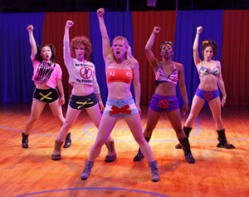 The award-winning Transport Group has lately been living up to its name, presenting site-specific revival of such works as The Boys in the Band and Hello Again in lofts in Chelsea and Soho respectively. Their latest production, Lysistrata Jones, makes even cannier use of an unconventional space. This musical updating of Aristophanes’ comedy concerns a group of high school women who decide to withhold sex from their boyfriends on the perennially losing Athens University basketball team until they win a game. So where better to mount the show on than on the basketball court of the Judson Memorial Church gymnasium?
The award-winning Transport Group has lately been living up to its name, presenting site-specific revival of such works as The Boys in the Band and Hello Again in lofts in Chelsea and Soho respectively. Their latest production, Lysistrata Jones, makes even cannier use of an unconventional space. This musical updating of Aristophanes’ comedy concerns a group of high school women who decide to withhold sex from their boyfriends on the perennially losing Athens University basketball team until they win a game. So where better to mount the show on than on the basketball court of the Judson Memorial Church gymnasium?
The fact that the church boasts a long and storied Off-Broadway history adds additional resonance to this cheekily entertaining diversion featuring a book by Douglas Carter Beane and music and lyrics by Lewis Flinn.
Resembling a special-themed episode of Glee, the show is more notable for the charged energy of its youthful ensemble than its creative elements. And it wears out its comedic welcome long before the conclusion of its two hour-plus running time.
Still, there’s fun to be had, beginning with the outrageous presence of the big-bodied Liz Mikel as the show’s acerbic narrator, Hetaira. Beane’s book, gleaning most of its vulgar humor from the overcharged sex drives of both the male and female characters, has a suitably burlesque quality. And while the score boasts few memorable songs, such numbers as “Right Now” and the climactic “Give It Up!” display a raucous energy.
Director Dan Knechtges (Xanadu, The 25th Annual Putnam County Spelling Bee) keeps things moving at an enjoyably frantic pace, and his choreography, influenced by both cheerleading routines and basketball court moves, is consistently inventive.
Among the ensemble, the standouts are Patti Murin, who provides just the right amount of perky sexiness as the title character; Jason Tam, very amusing as her unlikely, social media-obsessed love interest; and Josh Segarra, goofily endearing as the head jock.
Judson Memorial Church, 253 Thompson St. 866-811-4111. www.transportgroup.org.
Review: The Best Is Yet to Come: The Music of Cy Coleman
Jun 3rd
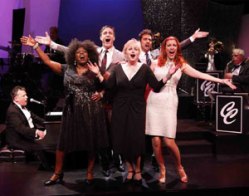
The Best is Yet to Come: The Music of Cy Coleman, the new musical revue inspired by the famed composer of such Broadway hits as Sweet Charity, Barnum, City of Angels and many others, raises inevitable questions. What to leave in? What to leave out? Do you concentrate on the well-known hits or excavate the little-known gems? And if you’re going to stick to a running time of under 90 minutes, a lot of great songs are not going to make the cut.
Fortunately, the show, devised and directed by David Zippel (Coleman’s collaborator on City of Angels) is entertaining enough to compensate for any quibbles. Personally, I would have liked far more from some of my favorites, like On the Twentieth Century and I Love My Wife, and less from the unfinished musical about Napoleon.
But there’s no arguing about the top-notch ensemble of musical performers that have been assembled, including Howard McGillin, Lillias White, Rachel York, Sally Mayes, David Burnham and the formidable Billy Stritch on piano. They’re accompanied by a first-rate eight-piece band, featuring plenty of horns to accentuate the composer’s brassy signature sound.
Each singer is given material that plays to his or her strengths. The comically adept Mayes mines all of the self-deprecating humor of “Nobody Does It Like Me.” The handsome McGillin brings a sly wit to “You Fascinate Me So,” which he turns into a smarmy seduction song by singing it to all of his female co-stars in succession. The big-voiced White belts “Don’t Ask a Lady” with powerful authority. Stritch infuses “It Amazes Me” with a genial, everyman quality. Burnham brings a warm sincerity to “Witchcraft.” And when the gorgeous, sultry York sings “Hey, Look Me Over,” well, was there ever any question?
The clear highlight, however, is White’s rendition of “The Oldest Profession” from The Life, for which she won her well-deserved Tony Award. Her hilariously world-weary delivery of the bawdy number reveals no staleness despite the endless number of times she’s sung it.
Frustratingly, some of the best songs are shoehorned into medleys but, as they say, it’s better to leave the audience wanting more. And while the intimacy of the theater at 59E59 is nice, there are times when the big voices and loud arrangements overwhelm the room. But that shouldn’t be a problem for long, as this show well deserves a transfer to a larger theater for an extended run.
59E59 Theaters, 59 E. 59th St. 212-279-4200. www.59e59.org.
Reviews: Knickerbocker & Cradle and All
May 26th
Two new Off-Broadway comedies demonstrate that the current crop of playwrights is clearly grappling with parenthood issues. Both Jonathan Marc Sherman’s Knickerbocker and Daniel Goldfarb’s Cradle and All deal with impending, possible and actual child-rearing in a manner that suggests genuine anxiety. It’s probably no coincidence that both were written by men.
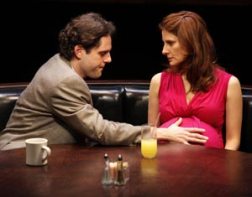 Knickerbocker, presented as part of the Public Theater’s Public LAB series, depicts the worries of an about-to-be father, 40-year-old Jerry (Alexander Chaplin), who is clearly unsure that he’s up the task. Taking place at the titular restaurant in the East Village, it consists of a series of dining room conversations between the nervous Jerry and various friends and loved ones, nearly all of whom ask the same question: “Are you ready?”
Knickerbocker, presented as part of the Public Theater’s Public LAB series, depicts the worries of an about-to-be father, 40-year-old Jerry (Alexander Chaplin), who is clearly unsure that he’s up the task. Taking place at the titular restaurant in the East Village, it consists of a series of dining room conversations between the nervous Jerry and various friends and loved ones, nearly all of whom ask the same question: “Are you ready?”
Not surprisingly, Jerry’s not at all sure that he is. His beaming wife Pauline (Mia Barron) clearly has no such problem. His friend Melvin (Ben Shenkman), a father himself, tries to assure him with such advice as “It’s all scary, but in a good way.” Meanwhile, his stoner friend Chester (Zak Orth, channeling Zack Galifankis, but in a good way), is aghast. “You’re ruining your life,” he bluntly declares.
Most of these interactions, including Jerry’s emotion-charged conversation with his father (Bob Dishy) who had to raise him alone after Jerry’s mother died when he was a young boy, have a predictable, repetitive feel, as if culled from an episode of The Oprah Winfrey Show devoted to the topic. The only scene that truly throbs with complex vibrancy is Jerry’s reunion with a tart-talking ex-girlfriend (the excellent Christina Kirk), with their alternately flirtatious and baiting interactions subtly revealing the pain of missed opportunities.
 Cradle and All literally tries to show both sides of the issue. In the first act, we see a young couple, Clare (Maria Dizzia) and Luke (Greg Keller), vociferously arguing over Clare’s suddenly expressed desire to have a baby after he returns home expecting a quiet evening of sushi (from Nobu, no less) and good wine. The ensuing painful conversation, filled with shattering emotional revelations, threatens to tear the couple apart.
Cradle and All literally tries to show both sides of the issue. In the first act, we see a young couple, Clare (Maria Dizzia) and Luke (Greg Keller), vociferously arguing over Clare’s suddenly expressed desire to have a baby after he returns home expecting a quiet evening of sushi (from Nobu, no less) and good wine. The ensuing painful conversation, filled with shattering emotional revelations, threatens to tear the couple apart.
In Act II we are introduced to the couple in the apartment next door. Played by the same performers, they are Anne and Nate, the harried parents of a newborn who won’t stop crying after being put to bed. Desperate to resolve the problem, they are determined to follow the advice of a how-to parenting book ominously titled “The Extinction Method,” which consists of ignoring the child until it exhausts itself. Their resulting anguish as the long hours pass by is given a sitcom-style comedic treatment, resembling a long lost episode of a post-little Ricky I Love Lucy .
While the writing is largely predictable and formulaic in its blunt presentation of its themes, the evening benefits from a terrific staging by British director Sam Buntrock (Sunday in the Park with George). The set designs by Neil Patel tell the story almost more than the writing itself: Clare and Luke’s Brooklyn Heights apartment is well-appointed and impeccably neat, while Anne and Nate’s is filled with baby paraphernalia, randomly disheveled in the familiar manner that suggests the impossibility of even trying to keep things from getting out of hand.
The sound effects are equally effective. When we hear the anguished cries of the infant emanating from a baby monitor, they sound, as Nate painfully puts it, like those of “a dying animal.”
Although the performers struggle with their characters’ rigid emotional postures in the first act, they blossom in the second, hilariously playing in knockabout fashion such comic highlights as when Anne attempts to physically restrain her increasingly hysterical husband from entering the baby’s room.
Of course, in both of these plays the decks are rather stacked. By the end of Knickerbocker, Jerry, not surprisingly, manages to overcome his insecurities. And the harried new parents in Cradle are far more endearing than the squabbling childless couple. While watching either one, you can practically hear the sound of ticking biological clocks emanating from the audience.
Public Theater, 425 Lafayette St. 212-967-755. www.publictheater.org.
City Center Stage I, 131 W. 55th St. 212-581-1212. www.nycitycenter.org.